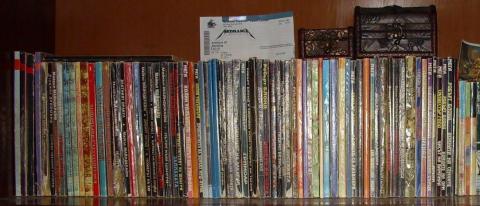A Tribute to Valeri Petrov
28.08.2014 § 1 Comment
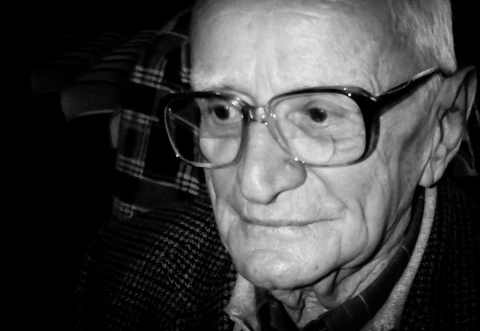
On August 27, 2014 we lost the poet Valeri Petrov. The writer, the translator, the humanist, the thinker, the example Valeri Petrov.
And oh! So gorgeous-starry was the night,
That our everyday plights,
Vain, summery,
Fleeting,
With their “Wonderful”s, “Hurrah”s and “Bravo”s,
Head over heels took off, retreating.
…
For I felt large under the starry dome
– and are we naught but atoms with no goal? –
And all around was peace and calm,
And beauty filled my soul.Valeri Petrov
With his poetry, he could make us laugh and cry within a single stanza, experience the chill of autumn or the breath of spring. In translating Shakespeare, he laid out the staggering beauty of Bulgarian verse before us and created something more: the stories and images of the Bard in our own melodious tongue. With the script for “Knight Without Armour” (YouTube link), he put his finger on our worst societal sores through the eyes of a carefree, as-yet-unburdened child. With “Five Tales”, he gave our children mountains, deer friends and the ocean floor to imagine and explore. He never grew up, and yet his genius never faltered, never waned, until the end.
Celebrating Cyrillic
24.05.2014 § 5 Comments
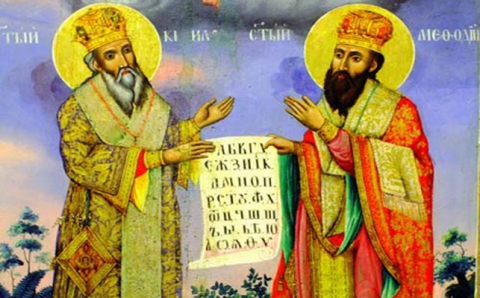 May 24th is celebrated in Bulgaria as the day of two saints: St. Cyril and St. Methodius, of Bulgarian education and culture and Slavonic literature. It is a widely observed holiday in the country, on par with Liberation Day (March 3) and Christmas. It is a day largely devoted to celebrating the creation and the existence of the Cyrillic alphabet, which Bulgarian is written in.
May 24th is celebrated in Bulgaria as the day of two saints: St. Cyril and St. Methodius, of Bulgarian education and culture and Slavonic literature. It is a widely observed holiday in the country, on par with Liberation Day (March 3) and Christmas. It is a day largely devoted to celebrating the creation and the existence of the Cyrillic alphabet, which Bulgarian is written in.
Bulgaria may not be the largest user of Cyrillic today, but it is the first. The Cyrillic alphabet was the official script of Bulgaria before it was spread to Russia, Croatia, Serbia, etc. and it was Bulgaria’s Boris I who commissioned the two literary schools where thousands of monks would be educated and the first thousands of books in the new alphabet would be hand-copied and spread across the land.
It may be strange to see such importance placed on a set of symbols that we take for granted, but there is a great reason for our fascination with our letters, and a great accompanying story: the story with the greatest cultural significance in Bulgaria’s history.
Protest Poetry #6: “The fight is hard and pitiless”
04.08.2013 § Leave a comment
Bilingual poetry in support of the protests in Bulgaria. English version from Anthology of Bulgarian Poetry (translated by Peter Tempest)
The fight is hard and pitiless
The fight is hard and pitiless.
The fight is epic, as they say.
I fell. Another takes my place –
Why single out a name?
After the firing squad – the worms.
Thus does the simple logic go.
But in the storm we’ll be with you,
My people, for we loved you so.
2 p.m. – 23.VII.1942
Nikola Vaptsarov
Protest Poetry #5: “Elegy”
03.08.2013 § Leave a comment
Bilingual poetry in support of the protests in Bulgaria. English translation is mine.
Elegy
Tell me, tell me, o unhappy people,
Who lulls you in the cradle of slavery?
Is it the one who our Saviour speared
On the cross in the ribs without pity,
Or the one who for years sang to thee:
“Endure, for it is your duty.”
Protest Poetry #4: “Come see our plight”
02.08.2013 § Leave a comment
Bilingual poetry in support of the protests in Bulgaria. English version from Anthology of Bulgarian Poetry (translated by Peter Tempest)
Come see our plight
I hear one cry of deep despair
In cottage, tavern – everywhere.
Each peasant home a pitiful sight
That mind and soul can hardly bear!
“Come see our plight!” « Read the rest of this entry »
Protest Poetry #3: “Where do you lie, faithful love for our people?”
31.07.2013 § Leave a comment
Bilingual poetry in support of the protests in Bulgaria. English translation is mine.
Where do you lie, faithful love for our people?
Where do you lie, faithful love for our people
Where do you gleam, spark of patriotism?
O grow to feed a mighty flame
And stoke a blazing fire today
In our young people’s beating hearts
to roam the woods and take up arms.
Protest Poetry #2: “You cannot quench what’s not for quenching”
30.07.2013 § Leave a comment
Bilingual poetry in support of the protests in Bulgaria. English version from Anthology of Bulgarian Poetry (translated by Peter Tempest)
You cannot quench what’s not for quenching
We’re glad when on a sunny day
The golden glowing sun has risen,
But more so when a single ray
Of sunlight penetrates a prison.
« Read the rest of this entry »
Protest Poetry #1: “Patriot”
29.07.2013 § Leave a comment
Bilingual poetry in support of the protests in Bulgaria. English version from Anthology of Bulgarian Poetry (translated by Peter Tempest)
Patriot
No sacrifice he deems too small
For freedom or education
Self-sacrificing? Not at all.
He sacrifices the nation. « Read the rest of this entry »
“Craving”
29.04.2013 § Leave a comment
A short story by Bulgarian author Aleko Konstantinov, translated by V. Pandeliev.
That I am a lucky man*(1), that all of Bulgaria knows. But one thing no one knows is that today I didn’t have 45 stotinki*(2) to buy myself tobacco. This circumstance did not deter me however from preserving my regal demeanour. I continued to look upon the world and the people in it as if I could fit a million Rothschilds and Vanderbilts*(3) into my vest pocket, while our own wealthy men were worth no more to me than the ashes of last night’s final cigarette. That is all well and good, but there’s still no tobacco, the devil take it all! Silly craving!
Gamebooks in Bulgaria: the Reader as Protagonist
24.01.2013 § 1 Comment
Dear readers, long time no update. Please forgive my absence. I’m restarting regular contributions to this blog with a post I’ve been meaning to put together for a while.
The early to mid-nineties were a strange time in Bulgaria. Many people growing up in those days (like myself) found themselves in a gaming vacuum. Computers and gaming consoles were exceedingly rare, yet we were all well aware of their potential as entertainment devices, and we were desperately searching for something to fill the entertainment void. All that was needed was a fortuitous event and an invention to fill the void.
One day, Lubomir Nikolov (Любомир Николов), an English-Bulgarian translator, stumbled across an English gamebook in a used bookstore. He quickly figured out how to read it, and realized that no one in Bulgaria had seen anything like it.
A gamebook is a piece of interactive fiction in which the reader makes choices that affect the progression of the story. In a sense, the reader is playing the book as a game, being rewarded for good choices and punished for bad ones. Gamebooks are often written in the first or second person, contributing to the illusion that the reader is in fact the main character of the book. « Read the rest of this entry »
Poet Profile: Penyo Penev
25.09.2012 § 2 Comments
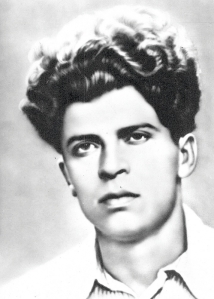
Penyo Penev
Until recently, the name Penyo Penev brought to memory a thin book with faded red covers on my grandfather’s nightstand, and little more. I knew he was a fan, and I knew that they had been classmates in a Sevlievo high school.
I only had to make an effort, to get curious, to find beyond the faded red covers a truthful, unhappy poet’s hopes, ideals and disappointments, bared in stark rhyme.
Penyo Penev was born on May 7, 1930 in the village of Dobromirka, Sevlievo municipality. He began writing in grade 3, and upon graduating in 1947, he eagerly joined the first youth brigades. These were labourer brigades, formed with an idealistic gleam in the name of implementing the new Socialist ideal in massive construction and agricultural projects. From that moment on, Penev’s life was intrinsically linked to his work as a builder, through which he experienced the practical realization of his dream of creating a new, better world. His poems reflect the optimistic outlook of the first years of Communism in Bulgaria, the notion of sacrifice for the good of future generations. While working in the new city of Dimitrovgrad, he fell in love with its fresh, idealistic outlook. He married his wife there, he had his son there, and there he experienced his most fruitful and happiest years.
The Treasure of Slaveykov Square
24.08.2012 § 1 Comment
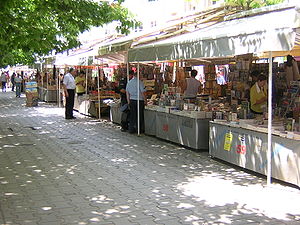 Sofia’s Slaveykov Square, named after father-son poet duo Petko and Pencho Slaveykov, is a bustling marketplace for one of the most coveted and important commodities in the nation: books. As a small country with a significant contribution to world literacy, reading and books have always been prized very highly in Bulgaria. The years of the Socialist boom were also the heyday of publishing, with hundreds of Bulgarian authors being printed alongside translations of world classics. Many of these books, often produced in hardcover and printed to last, have been resurfacing in used book stalls alongside new books and editions. « Read the rest of this entry »
Sofia’s Slaveykov Square, named after father-son poet duo Petko and Pencho Slaveykov, is a bustling marketplace for one of the most coveted and important commodities in the nation: books. As a small country with a significant contribution to world literacy, reading and books have always been prized very highly in Bulgaria. The years of the Socialist boom were also the heyday of publishing, with hundreds of Bulgarian authors being printed alongside translations of world classics. Many of these books, often produced in hardcover and printed to last, have been resurfacing in used book stalls alongside new books and editions. « Read the rest of this entry »
Pinocchio (Intermediate Bulgarian Text)
30.07.2012 § Leave a comment
The following is a retelling of the story of Pinocchio by Carlo Collodi.
Имало едно време в Италия майстор дърводелец на име Джепето. Той си нямал деца и дълго търсел говорещо дърво, от което да си измайстори кукла за свой син. Най-сетне в един мразовит ден той открил вълшебното дърво и започнал да дяла от цепеницата човече.
И какво мислите се случило?
Издялал Джепето главата на човечето и като издълбал очите, то го погледнало насмешливо. Оформил устата, а тя, вместо да каже “Скъпи татко”, му се изплезила. Сглобил Джепето ръцете на куклата, а те го пернали по челото. Сглобил и краката – ритнали го. Ядосал се тогава дърводелецът:
– Това човече е голям немирник. За назидание ще го нарека на името на стария просяк от парка Пинокио! « Read the rest of this entry »
Transliteration of “Боженци”: Bonus Post
29.07.2012 § Leave a comment
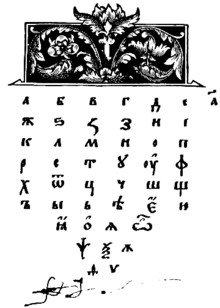 While I was writing about the village of Bozhentsi, I came face to face with a very common issue that occurs when converting between alphabets: transliteration. Not only do some Cyrillic letters lack direct equivalents, they are also differently transliterated in different Western languages. I’ll use the name of the village of Bozhentsi as an example.
While I was writing about the village of Bozhentsi, I came face to face with a very common issue that occurs when converting between alphabets: transliteration. Not only do some Cyrillic letters lack direct equivalents, they are also differently transliterated in different Western languages. I’ll use the name of the village of Bozhentsi as an example.
Are You Sure?
16.07.2012 § Leave a comment
A mini-post about an interesting quirk of the Bulgarian language. In Bulgarian, сигурен (siguren) is an adjective that means “certain, doubtless”. However, when answering a yes/no question, “sigurno” does not mean “doubtless”, it means “perhaps”, which is far less definite. Add this to our shaking heads for “yes” and nodding for “no” and it’s no wonder Bulgaria is poorly understood 😉
“The Errors of Santa Claus” – Parallel Text
20.06.2012 § 3 Comments
Due to a serious lack of parallel English-Bulgarian text for learners, I have decided to experiment with posting professional Bulgarian translations of English-language material and aligning the source and translated text for the benefit of learners of Bulgarian. What follows is the beginning of a short story by Stephen Leacock.
Time in Bulgarian
15.06.2012 § 2 Comments
- Second: секунда (sekúnda)
- Minute: минута (minúta)
- Hour: час (chas) – possibly a shortened version of част (chast), meaning “part” (of a day)
- Day: ден (den)
- Night: нощ (nosht)
- Week: седмица (sédmica) – shares a root with седем (sédem), meaning “seven”
- Month: месец (mésetz)
- Year: година (godína) – the archaic лето or лет, similar to Russian, is also sometimes used
- Decade: десетилетие (desetilétie) – the root for 10 (десет), followed by the archaic root for year (лет)
- Century: век (vek)
- Millenium: хилядолетие (hilyadolétie) – the root for 1000 (хиляда), followed by the archaic root for year (лет)
- « Read the rest of this entry »
Ordinal Numbers in Bulgarian
15.06.2012 § 1 Comment
I hope your counting in Bulgarian is significantly up to snuff to tackle the thorny issue of ordinal numbers (“first”, “second”, etc.) which are crucial for correctly saying dates in Bulgarian.
The reason ordinal numbers are a thorny issue is that unlike cardinal numbers, they are gendered. We remember, class, that Bulgarian has three genders: masculine, feminine and neuter. So, there are three forms of “first” in Bulgarian:
- M: първи (púrvi)
- F: първа (púrva)
- N: първо (púrvo)
The nice thing is, once you learn the ordinal forms in Bulgarian, you can accord to gender simply by changing the suffix: -и for masculine, -а for feminine and -о for neuter.
Numbers in Bulgarian
11.06.2012 § 5 Comments
Bulgaria uses the Indo-Arabic numeral system known around the world.
We begin, as always, counting from 1 to 10.
- Едно (ednó)
- Две (dve)
- Три (tri)
- Четири (chét’ri)
- Пет (pet)
- Шест (shes‘)
- Седем (sédem)
- Осем (ósem)
- Девет (dévet)
- Десет (déset)
The Definite Articles of Bulgarian
06.06.2012 § 9 Comments
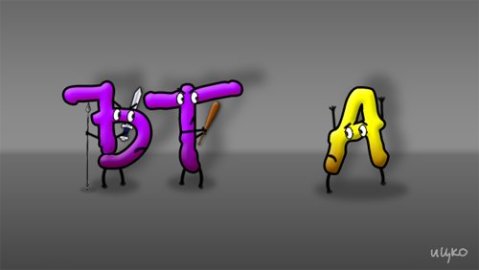
Image source: Icko (http://grasshopper.xroads-bg.com/open.php?id=21)
Never mind five names for “uncle”, the definite article in Bulgarian is a truly cross-eye-inducing grammar nugget.
The definite article in English is easy: “the“. That’s it. The tub, the king’s wizards, the pretty pony. Not so in Bulgarian.
Words for Relatives in Bulgarian
05.06.2012 § 10 Comments
Bulgaria is a place where you cannot be farther than 500 km away from your family, no matter how hard you try. Families often live in the same area or, if they don’t, one can always take a quick holiday to visit the folks на село (na selo, meaning “back in the village”). In fact, children often spend the summer months with one or the other set of grandparents somewhere in the country: in a village, a town or a small city.
The centuries-old familial traditions and bonds are reflected in the Bulgarian language. Much like the proverbial Inuit and their many words for snow, there are five different words for “uncle” in Bulgarian, four for “aunt”, three for “brother-in-law” and four for “sister-in-law”.
The Footprints in the Butter: Bulgarian Jokes
04.06.2012 § 1 Comment
In Bulgaria, the concept of a виц (vitz, a joke/funny story/anecdote) is very highly developed. Vitzove may be directed at politicians, nationalities, occupations, family members, or famous characters. Typically longer than English jokes, vitzove begin with a set-up, and may involve telling a long and elaborate story. As with all culture-specific issues, I hope you don’t find the translations too cumbersome or dense. This is just a random smattering so you know a Bulgarian joke when it’s your turn to tell one.
June 2 – Day of Botev and all those who fell for the freedom and independence of Bulgaria
02.06.2012 § 3 Comments

Hristo Botev
Every year on June 2 at noon, for three minutes the air raid sirens across Bulgaria sound in alarm. Cars stop, pedestrians bow their heads and students rise at their desks. Everyone observes a moment of dignified silence.
The sirens have long since stopped warning of imminent danger – there are no enemy airplanes over Sofia, no foreign armies marching across the Thracian plains. The sirens sound to remind us of those Bulgarians who died for Bulgaria’s freedom and present-day peace. On June 2 Bulgaria remembers the armies of khan Tervel, who defended Europe against the Arabs, the defenders of Medieval Tarnovo, the heroes of the April uprising, the martyrs of Shipka, the young Bulgarian flying aces who defended Sofia from English and American bombers, as well as countless other known and unknown Bulgarians who laid their lives in the name of our sovereignty.
Bulgarian Names and Naming Customs
26.05.2012 § 2 Comments
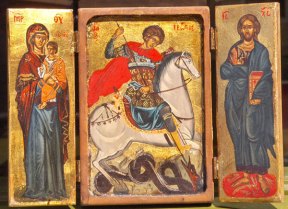 Bulgarian given names are taken from a variety of sources. Biblical, Greek and Latin (like much of Europe), but also Slavic and Protobulgarian names abound among the population, with various regional varieties and pronunciations.
Bulgarian given names are taken from a variety of sources. Biblical, Greek and Latin (like much of Europe), but also Slavic and Protobulgarian names abound among the population, with various regional varieties and pronunciations.
Geórgi (George), Iván (John, pronounced “ee-VAN”, not “I-vuhn”) and Dimítar are the three most popular boys’ names in Bulgarian. The first two are Biblical, after St. George and St. John the Baptist, respectively, while the last is the name of an important Orthodox military saint, St. Demetrius of Thessaloniki, and is distantly related to the Ancient Greek goddess Demeter.
Poet Profile: Valeri Petrov
20.05.2012 § 4 Comments
 Poet, playwright, screenwriter and translator, Valeri Petrov (pseudonym of Valeri Nisim Mevorah) is one of the most multifaceted talents in Bulgarian literature. In prose, verse and translation, his style is crisp, light and accessible and every rhyme underscores the beauty and melodiousness of the Bulgarian language.
Poet, playwright, screenwriter and translator, Valeri Petrov (pseudonym of Valeri Nisim Mevorah) is one of the most multifaceted talents in Bulgarian literature. In prose, verse and translation, his style is crisp, light and accessible and every rhyme underscores the beauty and melodiousness of the Bulgarian language.
« Read the rest of this entry »
